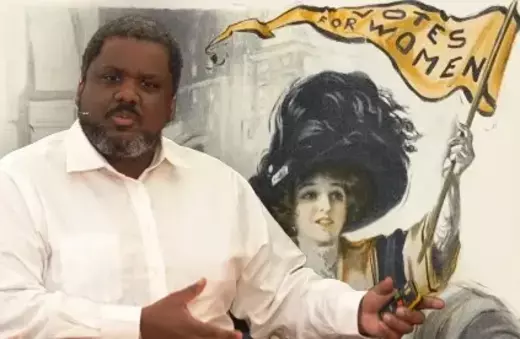America's ongoing crisis in cultural identity is at the root of its social unrest, and can be traced to a Cartesian preoccupation with essence driven by colonial ethnocide. An existential awakening is required to mend the nation's deep divides, writes Barrett Pitner.
As a Black American, my familiarity with the absurdity of American society is all I have ever known. How could a society that projects itself as a beacon of freedom for the world also be built around slavery? How could a global champion for democracy systematically deprive Black Americans of their voting rights? How could a pillar for the rule of law also have a legal system that disproportionately sentences Black Americas to longer prison sentences than white Americans? The list of American hypocrisies that Black Americans must confront can easily make you question your own sanity.
To understand how America has maintained the ruse for so long you only need to know two words: ethnocide and Existentialism. Tragically, America has always been in this dire state, but has long been able to mask its destructive absurdity with a facade of inspirational reality.
“Ethnocide” was coined in 1944 by Raphael Lemkin alongside its far better known sibling: genocide. Lemkin was a Polish Jew who fled the Nazis and escaped to America. While in America he implored the American government to intervene during World War II to save Jewish people, yet the Americans he met were unwilling to believe that Europeans could commit such despotic acts. In order to convince the American public of the atrocities befalling his people he committed himself to creating a new word to define this particular atrocity. This word became genocide, but initially it was genocide and ethnocide.
Since Jewish people were both a genos (people) and an ethnos (culture), he envisioned that genocide and ethnocide would be interchangeable. However, over time the words diverged and formed separate definitions. In genocide a people are exterminated or forcefully removed, and as a result their culture dies with them. During ethnocide the culture is destroyed, but the people remain.
Tragically, America has always been in this dire state, but has long been able to mask its destructive absurdity with a facade of inspirational reality.
Around the late 20th century, ethnocide started being used to describe colonial indoctrination programs that were forced upon indigenous people such as the Carlisle School in the United States, and the residential school system in Canada that forcefully removed indigenous people from their culture and literally beat and tortured a westernized education into them.
However, to fully understand the scale at which ethnocide has shaped American society, and many of the societies in the Americas, you must apply the language of ethnocide to the transatlantic slave trade. The explicit purpose of the slave trade was to forcefully remove the culture of African people, but keep their bodies in order to create a chattel slavery system. Europeans severed African tribal and familial bonds. Prevented Africans from practicing their religion and speaking their native tongue. They even worked to destroy African names, and replaced them with dehumanizing identifiers that are no longer culturally acceptable to say out loud.
Ethnocide did not aspire to break the bodies. It hoped to break their souls.
America’s ethnocidal foundation has systematically normalized a culture of perpetual division and exploitation. From slavery to the present, America has implemented countless laws and social mores that sustain the divisions of ethnocide. The resurgence of the Black Lives Matter movement shines a light on the terror that regularly befalls Black Americans at the hands of their own government.



















Join the conversation